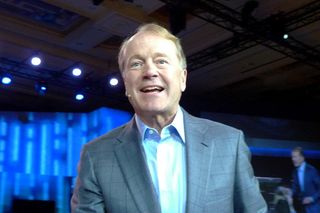The dawn of the Internet of Everything
We've reached an inflection point, according to Cisco CEO John Chambers.

John Chambers put on quite the show this week at Cisco's CES 2014 keynote.
"2014 will be the transformational pivot point for the Internet of Everything," the CEO claimed. He was also keen to point out that he wasn't simply talking about connectivity, but rather the way ubiquitous connectivity will drive process change in everything we do.
Chambers fired up a video with Sarah Silverman experiencing what the world would be like if the Internet of Everything was realised. In Silverman's world everything was connected, and everything she interacted with knew everything about her. Her future self made a point of mentioning that all her data was safe, secure and private Prism clearly doesn't exist in this particular future.
The point that Chambers was making, however, is that the technology is already there to make the Internet of Everything a reality, we just need to understand all that data we're collecting and do something useful with it.
The benefits on the horizon are financial as well as personal, with Chambers claiming that fully realising and implementing the Internet of Everything could be worth over $19 trillion.
The ubiquitous connectivity that we've come to enjoy is something that can make smart cities a reality around the world. So convinced is Chambers that smart cities will become the norm, that he believes that this time next year he'll be talking about smart countries.
Smart street lighting alone could provide a massive financial benefit, when you consider that 40 per cent of European government energy spending goes on streetlights. With streetlights that dim when no one is near them and light up when motion is detected, the amount of energy needed to run them could be slashed.
Get the ITPro. daily newsletter
Receive our latest news, industry updates, featured resources and more. Sign up today to receive our FREE report on AI cyber crime & security - newly updated for 2024.
Other utilities like waste management and energy metering could provide both governmental and individual savings. The key to all of it is ensuring that everything is connected with the data collected and centralised.
This being the Consumer Electronics Show, Chambers also highlighted that the Internet of Everything was even more real in the digital home. With pretty much every device and appliance already capable of connectivity, we can interact, control, monitor and entertain ourselves using whatever's closest to you.
And with Intel highlighting the need to interact more naturally with computing devices at its press conference at CES, it's clear that the technology that will enable the Internet of Everything needs to be transparent. It's not really about the technology, the hardware or even the connectivity, it's about the benefits it brings and how it can make our lives better.
Chambers believes that 2014 is the inflection point, the year when the Internet of Everything becomes real, tangible and beneficial. And he also believes that the next 10 years will have more impact on our lives than the whole internet era up to now. We'll find out soon enough if he's right.
Most Popular





